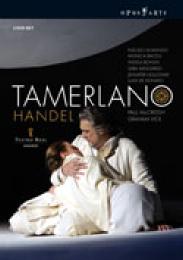Handel: Tamerlano (McCreesh)
Introduction
Handel wrote the music for Tamerlano in just 20 or so days in 1724, a year which also saw him produce Giulio Cesare and Rodelinda, and as with many early operas, especially in their formative years, it was re-written and re-produced in various ways after the first performance, and so there is never going to be any one definitive performing edition.
This production from Madrid has been created from an edition by Paul McCreesh and Benjamin Bayl (also playing harpsichord here) and which is apparently based on one of the earlier original Handel scores (with the death of Bazajet and the final coronation scene, either of which may have appeared in Handel's own production, but probably not both). It all seems to fall into place quite naturally however, although the relatively large string section used in Madrid tends to give a 'less-than-authentic' sound in many places. Having said that, the work contains some of Handel's finest music and it is worth getting to know a few of the arias if they are not already familiar.
The (very) cut down synopsis is as follows:
Bajazet, the defeated Ottoman emperor has been imprisoned by the Tartar emperor, Tamerlano. Bazajet's daughter, Asteria, has also been captured, and has fallen in love with Tamerlano's ally, Andronico, and the feeling is definitely mutual. Bazajet decides against suicide after being captured as he loves he daughter too much.
Tamerlano however, has also fallen in love with Asteria and so decides that Irene, a pricess to whom he was originally betrothed, should now marry Andronico, so he can have Asteria all to himself.
Not surprisingly, Bazajet, Andronico and Irene are not best pleased with this turn of events.
A huge amount of misunderstanding and double-crossing, including a plan by Asteria to kill Tamerlano, leads to Bazajet and Asteria deciding to poison themselves.
Tamerlano wants to humiliate the two and orders that Asteria becomes his servant. She must serve him some wine, but Asteria slips poison into the cup. Irene intervenes, letting Tamerlano know about the poison. Asteria is therefore ordered to offer the wine to her father or to Andronico before it comes to Tamerlano. Asteria decides to drink it herself before Andronico knocks it out of her hand.
Tamerlano is suitably angered and sends Asteria off to the palace brothel, so that her father can be properly shamed. He and Irene now begin to think of a happier life together, but Asteria and Bazerjet return. He has taken the poison himself and before his death, tells Tamerlano precisely what he thinks of him. Asteria also threatens suicide, and runs off. Tamerlano has been overcome by everything that has happened and pardons not only Asteria, Andonrico, but also Bazajet.
Preparations are made for Tamerlano's marriage to Irene after all.
Video
The video quality is very fine indeed, bringing out Giuseppe di Iorio's lighting (I imagine this is based on Matthew Richardson's ideas from the original production seven years earlier?) very well indeed.
Most of the colours in Richard Hudson's designs are muted to almost being monochrome, so when bright colours and various other effects are used, then this is caught brilliantly too.
Audio
Again, very good, although the clarity of orchestral detail you would expect from modern productions of Baroque operas isn't really forthcoming, but this isn't the fault of the DVD. All the vocal parts come through cleanly.
Extras
A c.20 minute interview with Paul McCreesh is all we get (not counting the decent essay on the opera withing the booklet by Juan José Carreras, who is most likely not a relation of Domingo's mate), but he is very forthcoming and honest about the problems in staging such an opera and training an orchestra in baroque techniques. For such a release, anything from Domingo himself would have been rather special so it's shame he doesn't appear.
The subtitles are rather archaic, as if they were taken from one of those dusty piano scores you find in libraries, and so don't make the easiest of reads, but the basic plot lines are clear, moreso if you follow the synopsis before watching the whole thing.
Conclusion
As Domingo has advanced in his career, he has ventured into many areas of music you wouldn't normally associate with someone who is probably more suited for the Romantic repertoire, notably his immense performance as Siegmund in the ROH Ring just a few years ago.
Mentioning that I was reviewing a Handel opera with Domingo raised a few eyebrows amongst my musical friends, as this is one area of music you really wouldn't expect him to succeed at, and I'm afraid it is in fact not always a success. You can't help but get drawn into his character though, as his acting knocks spots off most of the cast, and when he is on stage, he demands your attention as his musicality and the character's flawed humanity shines through. His final scene is incredibly moving, and it is here that we see Domingo at his best , with vocal control younger singers can only dream of achieving.
The main problem is that, maybe due to age, his voice just isn't as nimble as it needs to be in some of the passagework, and you feel as if he wants to dwell on some of the phrases far more than is safe for music such as this.
As for the rest of the cast, who seem to be far more at home in Baroque repertoire, things are a mixed bag, but generally very satisfying.
I thoroughly enjoyed my first encounter with Ingela Bohlin as Asteria. She has a light voice compared to the others, but it is perfectly suited to Handel's style. Non è più tempo in the second act is particularly lovely.
Monica Bacelli as the eponymous 'hero' is hampered slightly by the silly choreography which seems to go with many of the arias in this production (even in the background, where the actors are too distracting), but has a powerful voice, and if it weren't for coming across as a slightly more camp than cruel captor, would be another major draw for buying this set.
Sara Mingardo as Andronico has some scarily low notes to overcome, but manages the part the some flair, even if her character comes across as somewhat one-dimensional.
Jennifer Holloway as Irene has one of the best entrances I've seen in an operatic poroduction, coming in on a bright blue elephant. She has an expressive sound, although sings a little under the note at times, but is very entertaining as the jilted princess vowing for revenge.
The set design by Richard Hudson is very impressive, although I wasn't sure about what it all 'meant' (again, something 'extra' in the extras would have helped here), but everything is put to good use and interest is not lost as the opera continues.
The orchestral playing is ok, but as I mentioned earlier, the amount of string players used tends to blur the edges a little, and much of the detail is lost. Apart from this, there is obviously some problem with a few players automatically adding a little bit too much vibrato (one fiddler seems to be unable to stop her hand shaking when the camera focussees on the pit) which muddies the sound even more. This was probably an interesting exercise for them, but it would have been more exciting with an experienced baroque group and conductor who would have kept things moving forward. Here, a lot of the music seems rather heavy-handed, and makes the piece seem longer than it already is.
Perhaps one for avid Domingo fans only, although picking your way through the arias will undoubtedly unearth a few gems that are likely to stay with you for a long time.













































Your Opinions and Comments
Be the first to post a comment!